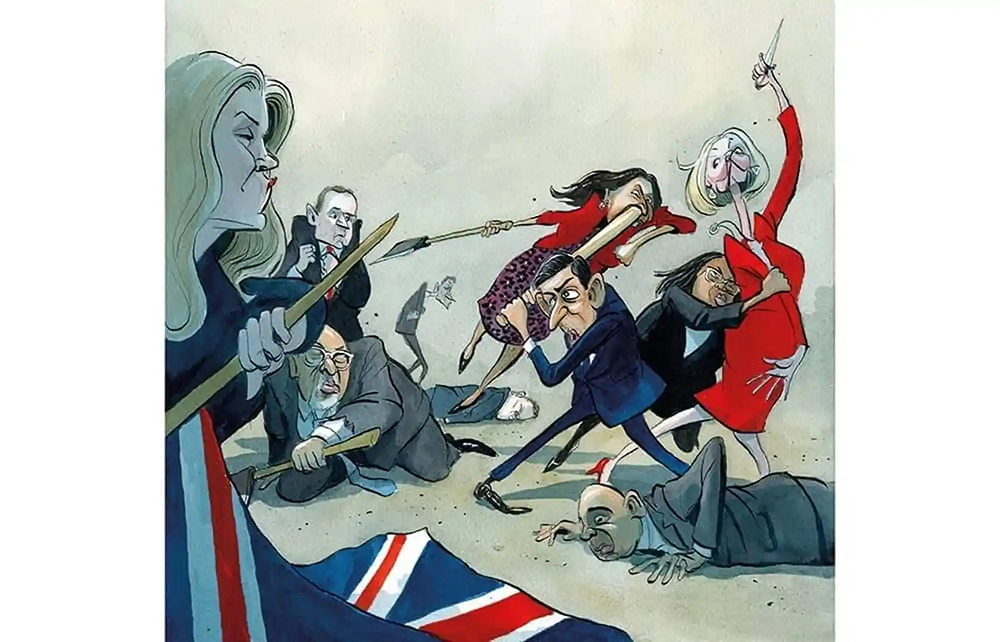Right is wrong
Sir: Katy Balls’s article ‘Survival Plan’ (4 May) starts from a false premise. The problem is not Rishi Sunak, but the current Conservative party’s underlying ethos. With Brexit, the lunatics took over the asylum. The ‘Get Brexit Done’ single-issue election resulted in a Conservative party, cabinet and parliamentary majority sharing populist right-wing views and convinced that the country supported them in all their beliefs.
Although Brexit has clearly failed and Boris Johnson has been disposed of, many of the underlying convictions associated with the Brexit philosophy remain. The obvious demonstration of this was the disastrous election of Liz Truss as leader despite the common sense warnings of Sunak at the time. Sunak is now trapped by the ideologically led Rwanda policy, which the party won’t let him escape from.
Just as Labour has regained the centre ground by purging Jeremy Corbyn’s beliefs and policies, so the Conservative party will have to rid itself of a mindset doomed to repeat past mistakes. A spell in opposition will give it the opportunity to do so.
Bob Calver
Burnham on Crouch, Essex
Bursting the burble
Sir: Damian Thompson (Arts, 4 May) asks for a ‘burble-free’ classical-music radio station. He need look no further than SRG SSR Radio Swiss Classic. Having sought refuge from Radio 3’s tiresome output, many of us enjoy its simple formula of playing classical music, without jazz, news, weather or any verbose interruptions. Its only fault is that it doesn’t have Andrew McGregor presenting Record Review on Saturday afternoons.
Ben Hughes
Woodgate, Norfolk
Grandmother’s footsteps
Sir: Mary Wakefield’s article evoked many memories (‘In defence of my Victorian childhood’, 4 May). I was brought up by my widowed grandmother, who’d been born around the late 1890s, while my young mother (also widowed) went out to work. According to my gran, children were to be seen and not heard, particularly at the dinner table, meals had to be finished and choice was never an option. If I didn’t eat my food, I went without. Snacking was not a concept she recognised and greed was tantamount to murder, as was ‘showing off’. Gifts had to be responded to, on paper. Adults were to be deferred to at all times. ‘Answering back’ was rewarded with a shaking and the wrong side of her tongue. Injuries were regarded as learning curves.
My grandmother was tiny and terrifying but never cruel, and I loved her very dearly. She prepared me for what life can throw at us at times – which for her was a lot. Entitlement was not a word she would have recognised. She died quietly in her own bed while my mother and I were briefly out of her room; a member of a generation the like of which we will never, sadly, see again.
Linda Willby
Thornton-le-Dale, North Yorkshire
Judgment of Paris
Sir: I am sorry that Sean Thomas had such a horrible time in Paris (‘City of blight’, 4 May). My recent experience was the exact opposite. I have been to Paris about 30 times, and ten days ago I stayed with friends near the Champs-Élysées. The streets are cleaner than in London, the restaurants friendlier and the service better. There are plenty of taxis. The churches are a joy to behold. Many galleries were closed owing to the bank holiday on 1 May, but there was still plenty to see, such as the superb Al Thani collection at the Hôtel de la Marine.
Inevitably there’s a good deal of cleaning up going on for the Olympics, and there are a few beggars and drunks – but not as many as in London. I would urge your readers to go to Paris, particularly if, like me, they enjoy walking in a city. With the possible exception of Venice, there is no more beautiful place to be in than Paris.
David Astor
Chipping Norton, Oxfordshire
Will power
Sir: Dot Wordsworth’s piece on ‘stuff’ (27 April) was, as usual, both erudite and amusing. She could also have mentioned wise old King George III, who said, ‘Was there ever such stuff as great part of Shakespeare? Only one must not say so’, showing that Shakespeare had already become a national treasure, almost beyond criticism, even by the King.
P.C. Thompson
Worcester
Taylor made
Sir: In his review of Judith Flanders’s Rites of Passage (Books, 4 May), Kevin Toolis refers to The Rule and Exercises of Holy Dying as ‘a sort of manual on the best deathbed routines’. In fact, this was no mere handbook. First published in 1651 and still available today, it is one of the greatest works of Renaissance prose. Coleridge praised its author, Jeremy Taylor, as ‘the Shakespeare of divines’, and William Hazlitt wrote ‘when the name of Jeremy Taylor is no longer remembered with reverence, genius will have become a mockery, and virtue an empty shade!’ If his work was embraced by Victorian readers, that says a lot for them; and if he is less popular today, that may say something about us too.
Gregory Baruch
McLean, Virginia
State of emergency
Sir: Regarding Charles Moore’s lament (Notes, 4 May) over the state of Scottish governance, it should be clear that the SNP is pursuing policies of contrarianism while it remains denied independence – passing measures simply to create distance from Westminster rather than to further the interests of Scotland, as it was elected to do.
Direct rule from Westminster has yet to be debated, but the UK government should not wait until a disaster befalls the Scottish people, as happened in Northern Ireland. Devolution was a gift from Westminster, and the gift should be reclaimed if necessary. The Scottish government is in effect a supercharged local authority, but seems to lack regulation from London. The UK government has sent in civil commissioners to run failing local authorities in the past, and sending them to Edinburgh should be considered.
A service could also be performed for the Scottish people by drafting an Emergency Powers (Scotland) Bill defining the red lines, the crossing of which will trigger a re-imposition of direct rule.
Paul T. Horgan
Crowthorne, Berks
Rail life
Sir: Few would contend that rail privatisation has been a success, not least because its convoluted structure restricted competition and sustained unfettered union power. Nevertheless, those who had experienced British Rail welcomed the real improvements that did occur. To suggest that renationalisation cannot produce a worse service (Any Other Business, 4 May) seems unduly optimistic. State-run enterprises have a woeful record and there is no cogent reason to think a new government will change this, whatever its stripe. Just because a policy is popular doesn’t mean it will be successful.
Clive Thursby
Hindhead, Surrey
Write to us letters@spectator.co.uk







Comments